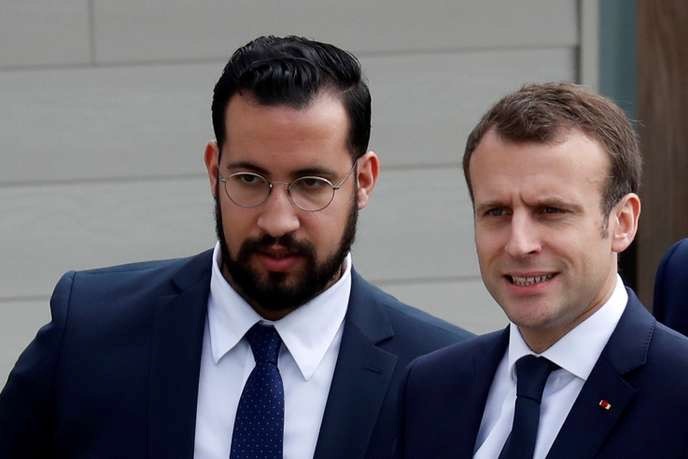
The first thing I noticed when I arrived in Paris this fall was an elaborate toilet graffito. “Macron pédale,” it began, using one of many French words for faggot. Then came a reference to Macron’s much older wife, Brigitte: “His grandmother has no shame.” And finally the big reveal: Macron is a tool of the Youpins (Yids). He once worked for the Rothschild banking interests, which is all this scrawler needed to put him in league with the elders of Zion. Well, an acolyte is one thing, but a catamite? Putain! (Holy shit!)
Now we come to the reason why this calumny is interesting. Of all the issues that Macron faces in his quest to make France a “modern” (i.e. neoliberal) state, one problem swirls around him like the Parisian winter mist. It is epitomized by a scandal involving the president’s bodyguard, the tall, dark, and handsome Alexandre Benalla. He’s often been seen by the president’s side, but last spring he went rogue, barging through police lines to beat up two May Day demonstrators. The government kept quiet about the incident until footage of the attack surfaced two months later—only then was Benalla dismissed, and he’s been charged with committing a violent crime. That led the press to dig deeper, and they found evidence of a close relationship between the president and the hunky thug. For one thing, Benalla had a key to the Macrons’ private residence, so he could come and go as he pleased. Photos of the two men that once seemed informal now looked, shall we say, interpersonal.
There is nothing definitive about a news photo; many gestures can seem intimate when they are isolated by the camera. But suddenly the pics of Macron hugging victorious players on the French soccer team looked more than merely celebratory. In a culture where men would sooner kiss each other on both cheeks than hold each other close, these American-style embraces raised brows higher than even the global conspiracy of lizard people. (Don’t ask!) To those who already resent this president, for whatever reason, something about him just doesn’t smell right, It’s only a question of identifying the odor.

Rumors about Macron’s sexuality have existed ever since he ran for office. There have been titters over his bromance with Justin Trudeau and allegations that he had a state radio executive fired because of gossip that they were lovers. These inferences have regaled the British press, always eager to see decadence across the Channel. But in France, the concept of pudeur—discretion—means that the media are careful about addressing innuendo when it involves a public figure’s private life. Pudeur is not what it used to be; it didn’t spare the former president, François Holland, from being photographed riding a motorbike, in a ridiculous helmet, en route to his mistress. Still, the ethic of discretion persists, and it’s a useful concept, part of the respect for privacy that allows for far more freedom from prying eyes than is true in America, where every text and email is subject to exposure and censure by an online mob. But sometimes pudeur is its own worst enemy.
Macron’s embrace of feminism, his support for gay rights, and his unorthodox marriage all form a matrix for those who see him as a tolerant and progressive leader. But those same alliances have allowed his less refined enemies to create an image of him as a prince of perversity. This stain on his reputation is why the Benalla affair is such an irresistible story, and it keeps on keeping on. Though the president severed their connection, it turns out that the bodyguard retained two diplomatic passports, and he has traveled far and wide, on lucrative private business, using his credentials as a calling card. What’s more, Benalla claims in interviews that he remained in touch with Macron after he was fired. He told France’s leading investigative website, Mediapart, that the president has sought his counsel about the Gilets Jaunes as well as “intelligence” and “security.” The government insists that the whole thing is a fabrication, but Benalla says, “It’s going to be very hard to lie, because all these exchanges are on my cell phone.” And so it rests, a cloud of suspicion hovering over a sea of indirection, in which no one can disprove what cannot be directly addressed.
A gay scandal that unfolds by implication is arguably more powerful than one that is demonstrably real. To start with, you don’t need a bathroom wall to spread rumors these days; they can be amplified quite efficiently by the internet. A fake Le Monde article, in which Benalla claimed that he and his boss were “more than friends,” has circulated widely in French political circles. Because it corresponds to suspicions that already exist, such a hoax can shape the way people see their leader. Just as the closet makes it possible to overlook the most obvious gay behavior, it can also make ambiguous behavior seem gay, until the aura of deviance fuels the most searing contempt. France legalized homosexuality long before the Anglo world, but it has never been respectable, and the whiff of sodomy can taint a politician’s reputation far more than an extra-marital affair. How, then, to deal with something so intangible that it is never proven but always present? The press reports the facts. No conclusions are drawn. But in the minds of many, a narrative takes shape, a tale of sexual secrets all the more compelling because it isn’t necessarily true but could be.
There is a legitimate public issue here. Should the president have been so close to his bodyguard, and why did Benalla continue to hold special passports after he was no longer part of the state? (He finally returned the credentials, but only after the damage was done.) Recall the gay scandal that sank New Jersey governor Jim McGreevy, who hired his buff Israeli lover to oversee security even though the man had no expertise. McGreevy’s attempt to come out as “a gay American” didn’t stem the pressure that forced him to resign. This was a major breach of duty, putting the people of his state at risk not long after the events of 9/11. Macron’s misjudgment, if that’s what it was, is nowhere near as significant, but there are some very unsavory possibilities. Were the passports meant to be a statement of appreciation for service, or were they a hedge against blackmail? Is Benalla acting like a jilted lover? The government says he is seeking vengeance—indeed.
Still, it’s likely that Macron has been sullied by homophobic attitudes of the sort that mustn’t be openly expressed. You can’t call someone a pédale in public here without risking a fine for hate speech. A Russian dancer has just been banned from the Paris Opera Ballet because of his homophobic tweets. But no one can regulate thoughts, and how do you fight beliefs that fester until they pollute an image? Macron has run the gamut from joking about having a gay hologram to insisting that Benalla was never his paramour, but such denials are as useless as apologies these days. What most people remember is the accusation.
Benalla has now been indicted for falsely using the passports—which begs the question of why he was able to keep them. Meanwhile, several investigations into the affair are underway. They may join the long roster of French political inquiries that are never resolved, or there could be more tantalizing evidence of something queer in the corridors of power. If this were America, every lurid possibility would be mined by the media for its entertainment value. Lindsay Graham, a bachelor, is a convenient target of gossip; liberal wags regularly issue smirking allegations about his sexuality. Just a few days ago an MSNBC anchor suggested that Graham was being blackmailed by Trump for kinky behavior. But in France, such rumors remain dormant. Well, I have a bias toward candor, and I have sometimes erred on its behalf. But it seems to me that it’s better to acknowledge innuendo than it is to be discrete. Unless, of course, you mean pudeur to be a knife in the back.